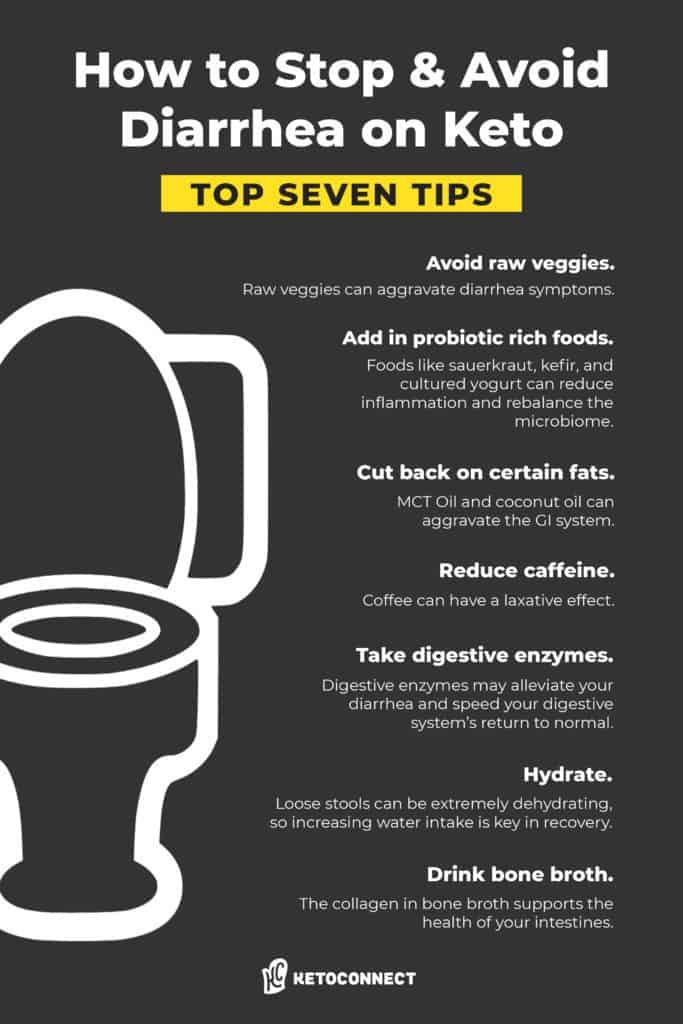

Avoid munching on raw veggies, which can aggravate diarrhea symptoms.What do you do to stop it? You have multiple options, depending on the source of the digestive issue: So, now you know what may be contributing to your bathroom bombshells. Take a break from this supplement, sticking to the magnesium in your diet, and see if your symptoms improve. However, magnesium increases stool frequency– the exact opposite of what diarrhea sufferers want. In order to counteract this effect, most people take extra magnesium to refill their electrolyte supplies. As the body flushes out stored water weight and adapts to running off of fats, it can lose a lot of electrolytes (which is part of the icky feeling of the keto flu). One of the primary issues that new keto dieters encounter is an electrolyte imbalance. It’s important to be vigilant about looking at your ratios of carbs, fat, and protein, especially when starting this eating plan, in order to prevent diarrhea. If protein intake is higher than fat, this can not only cause diarrhea, but keep the body from entering ketosis. Without the proper macros, poop problems may arise. Nevertheless, many inexperienced keto dieters end up eating high-protein and moderate fat instead. Keto is meant to be a low-carb, moderate protein, and high-fat diet. If your keto diarrhea doesn’t improve over time, you may want to get allergy testing or try an elimination diet. In fact, diarrhea is a major symptom of lactose intolerance. Even if you haven’t noticed significant problems in the past, increasing your dairy intake can uncover a food allergy. This is no problem… unless you have a lactose intolerance. Many keto recipes use dairy as a key component to add in fats. (A side note: some sugar alcohols (like maltitol) can still raise blood sugar in large amounts). If keto diarrhea strikes, look at how many sugar alcohols and substitutes you’re consuming. At this point, they have a laxative effect, contributing to diarrhea. This means that they’re often reaching the large intestine without being properly digested. Sugar alcohols are difficult for the gut to absorb. These are typically used to cut down on carbs from sugar, but can do more than just lower your carb intake. Look for ingredients like sorbitol, erythritol, maltitol, or xylitol. Here’s the problem: many sugar substitutes, like sugar alcohols, can cause gastrointestinal disturbances in people unaccustomed to consuming them. In an attempt to avoid it, many keto products and recipes feature sugar alcohols or other artificial sweeteners as a substitute. If you’ve been on keto, you already know that not only can natural sugar derail your net carbs for the day, but added sugar is terrible for your overall health - particularly, your digestion. There are some other, less obvious culprits that may be creating your bowel movement blues. However, don’t be too quick to place the blame solely on your new eating plan. Take care of your whole body, and your digestive system will thank you. However, the benefits far outweighed temporary loose stools and keto flu symptoms.Īgain, there’s a positive aspect: these symptoms can subside in one to two weeks if you continue with a ketogenic diet (no “cheat days”), replenish your electrolytes, and avoid strenuous activity. In one study, 40% of participants experienced keto diarrhea at some point. So, though this may be a short-term issue, in the long run, your GI system may thank you for going keto! Keto Flu Side Effectsĭiarrhea can accompany other side effects like nausea, bloating, headaches, fatigue, and decreased appetite in a phenomenon known as the “ keto flu.” Typically, the more diversity of gut microbes, the better the digestion is. One study found that keto increased gut microbiome diversity in the long run, after five to six months in people with severe imbalance.

As you can imagine, once the digestive tract is affected, your poop is too. Starting a keto meal plan certainly affects your microbiome, particularly in the stomach and intestines. Microbiome Changesĭietary changes affect gut bacteria composition. As your body adjusts to this new fuel source, fat, your diarrhea will likely subside after a week or two. So, your body may be pushing waste through your digestive tract faster than ever, which can cause diarrhea. A ketogenic diet is a huge adjustment from the Standard American Diet, and your body needs some time to modify its processes, especially bowel movements.īile is the product your body makes to break down fat. The simplest reason you may be experiencing digestive issues is the high-fat diet your body is now powered by. Here are a few factors of keto that can lead to tummy trouble. Of course, if you are experiencing these symptoms or gearing up to start a keto diet, you’ll likely find yourself asking if it’s treatable or temporary.


 0 kommentar(er)
0 kommentar(er)
